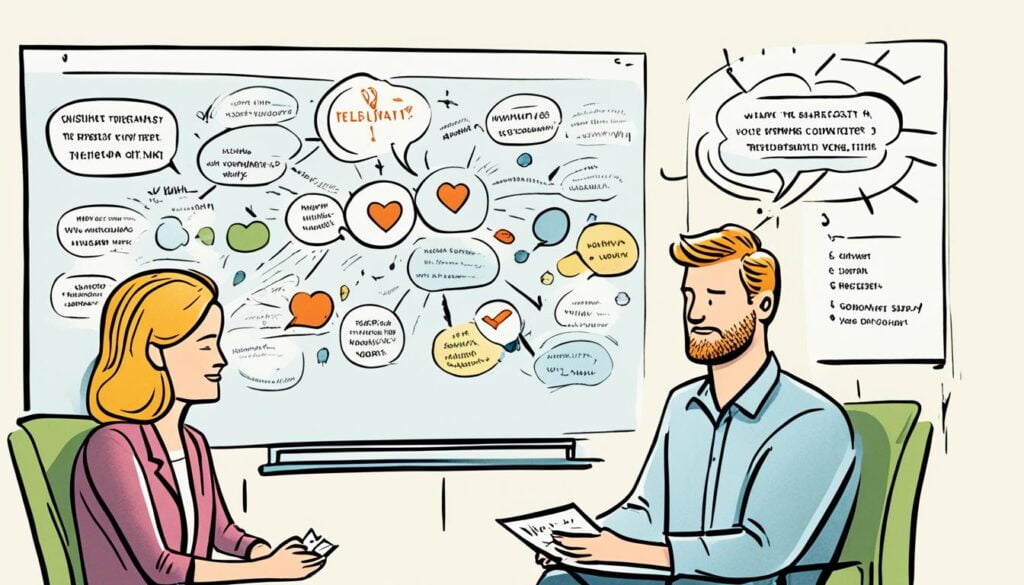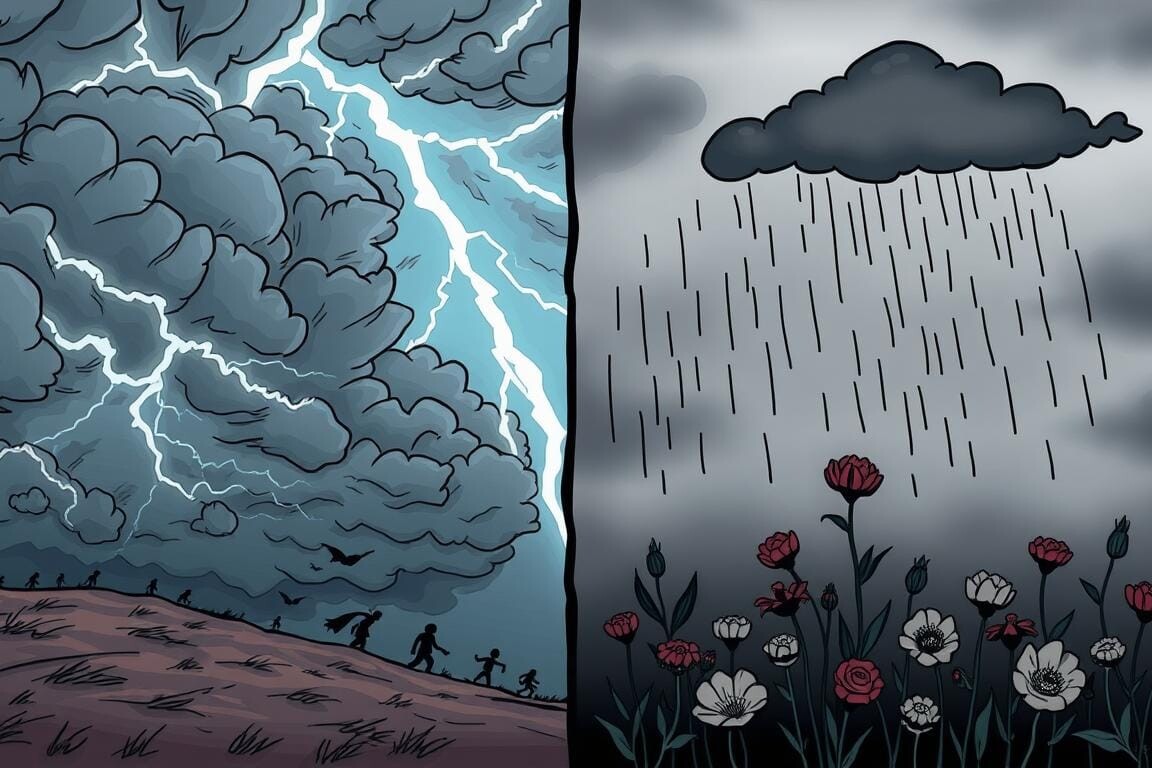At our practice, we know how anxiety can really affect your daily life. Luckily, cognitive behavioral therapy (CBT) is a great way to handle anxiety. We’ll look into how CBT helps with anxiety, so you can better your mental health.
CBT is a therapy that focuses on changing negative thoughts and behaviors. It helps you see and change these patterns. By understanding what makes you anxious and thinking differently about it, CBT stops the cycle of fear and worry.
With CBT, people with anxiety can learn to spot and question negative thoughts. They can also find better ways to cope. This leads to a better life overall.
Table of Contents
ToggleWhat is Cognitive Behavioral Therapy (CBT)?
Cognitive Behavioral Therapy (CBT) is a therapy that looks at how our thoughts, feelings, and actions are connected. It shows that our thoughts greatly affect how we feel and act. By changing negative thoughts, we can stop feeling anxious and find better ways to cope.
CBT believes that our thoughts, feelings, physical sensations, and actions are all linked. When we’re anxious, CBT helps us spot and change the negative thoughts that cause it. The aim is to stop feeling bad by changing how we think about things.
How Does CBT Work?
CBT is all about how our thoughts, feelings, and actions are connected. By spotting and challenging negative thoughts, we can stop feeling anxious and find better ways to cope. The steps of CBT include:
- Identifying the specific thoughts and beliefs that contribute to anxiety
- Evaluating the accuracy and helpfulness of these thoughts
- Replacing negative thought patterns with more realistic and adaptive ways of thinking
- Developing practical strategies to manage anxiety-provoking situations
Through CBT, people learn to see how their thoughts affect their feelings and actions. By working on negative thoughts, they can better manage their anxiety and improve their well-being.

How CBT Helps with Anxiety
Cognitive Behavioral Therapy (CBT) is a strong method that helps people deal with anxiety. It focuses on changing thought patterns and behaviors that cause anxiety. CBT shows us how our thoughts, feelings, actions, and physical sensations are all linked. This helps us stop the cycle of anxiety.
Identifying the Anxiety Chain
CBT teaches us to see the chain of events that makes anxiety worse. We learn how our thoughts, feelings, actions, and physical responses are connected. This knowledge helps us start to break the cycle of anxiety.
Disrupting the Anxiety Spiral
CBT helps us face our fears by taking action, not avoiding them. We slowly expose ourselves to what scares us, in a safe way. This helps us overcome our fears and stop avoiding things that make us anxious.
CBT gives us tools to handle anxiety better. We learn to question negative thoughts and take control of our anxiety. By tackling the core issues, CBT can improve our emotional health and make us stronger when faced with anxiety.

CBT Techniques for Anxiety
Cognitive Behavioral Therapy (CBT) uses many techniques to help people deal with anxiety. These methods focus on changing thought patterns and behaviors that cause anxiety. Let’s look at some common CBT techniques for anxiety:
Cognitive Restructuring
Cognitive restructuring is a key CBT method. It helps us spot and question negative thoughts. By looking at things from different viewpoints, we can change our thoughts. This makes us see things more realistically and feel less anxious.
Thought Challenging
Thought challenging is similar to cognitive restructuring. It makes us think about situations in new ways. This helps us understand things better and stops us from overreacting or making wrong assumptions.
Behavioral Activation
Behavioral activation is about doing activities and facing what scares us. By slowly facing our fears, we build confidence. This helps us handle our anxiety better.
Journaling
Journaling is a strong tool for managing anxiety through CBT. Writing down our thoughts and feelings helps us become more aware. It shows us what triggers our anxiety.
Behavioral Experiments
Behavioral experiments test our fears about the worst-case scenarios. By looking for evidence, we can change our negative thoughts. This makes us less anxious about the future.
Relaxation Techniques
CBT also teaches us relaxation methods like deep breathing and meditation. These help calm our minds and bodies. This reduces anxiety symptoms.
Using these CBT techniques daily can help us overcome anxiety. With effort and time, we can learn to handle stress better. This way, we can improve our well-being.

Cognitive behavioral therapy for anxiety
Cognitive Behavioral Therapy (CBT) is a top choice for treating anxiety. It helps people change their negative thoughts. This way, they can handle situations that make them anxious better.
CBT’s Effectiveness for Anxiety Disorders
Studies show CBT is great for managing anxiety disorders. It works for many issues like social anxiety and panic disorder. CBT changes the way people think, helping them cope better and live happier.
CBT’s success comes from changing negative thoughts. It uses methods like cognitive restructuring to help patients think more positively. This leads to less anxiety and better feelings overall.
CBT also helps with many types of anxiety. It’s good for those who worry a lot, fear social situations, or have intrusive thoughts. CBT is customized to meet each person’s needs, helping them deal with their anxiety.
Exposure Therapy
Exposure therapy is a key part of cognitive-behavioral therapy (CBT). It helps people with anxiety disorders like phobias or OCD. The idea is to slowly expose the person to things that make them anxious in a safe way.
This therapy aims to make people face their fears. It teaches them that the bad things they worry about don’t happen. By slowly facing their fears, they can stop avoiding things and live more freely.
The Process of Gradual Exposure in CBT
Exposure therapy, or gradual exposure in CBT, has a clear process:
- First, find out what triggers anxiety.
- Then, list these triggers from least to most scary.
- Start exposing yourself to these triggers slowly, from the least scary to the most.
- Use relaxation techniques and coping strategies to handle the anxiety.
- Keep exposing yourself to help learn that the feared outcome doesn’t happen and anxiety goes down.
Through exposure therapy for anxiety, people can stop avoiding things, change their thoughts, and learn better ways to cope with CBT exposure therapy.

CBT for Specific Anxiety Disorders
Cognitive Behavioral Therapy (CBT) is a powerful tool for treating many anxiety disorders. It helps with PTSD, OCD, panic disorder, social anxiety, and specific phobias. CBT improves symptoms and quality of life.
CBT is customized for each person. Therapists focus on the thoughts, behaviors, and feelings that cause anxiety. This approach helps break the cycle of anxiety and teaches new ways to cope with fears.
CBT for PTSD and OCD
For PTSD, CBT uses exposure therapy and cognitive restructuring. It helps people face their fears and deal with memories in a healthier way. This reduces avoidance and anxiety.
CBT also works well for OCD. Exposure and response prevention, along with challenging intrusive thoughts, help control compulsions. This reduces the impact of obsessions.
CBT for Panic Disorder and Social Anxiety
CBT is very effective for panic disorder and social anxiety. It helps clients recognize and change negative thoughts. This leads to better behaviors and less anxiety.
Techniques like slow breathing, role-playing, and facing social situations help people with panic disorder and social anxiety. These methods increase confidence and control in everyday life.
CBT for Specific Phobias
People with specific phobias, like fear of heights or spiders, benefit from CBT. Exposure therapy helps them gradually face their fears. This reduces the physical and emotional responses linked to phobias.
CBT changes the thought patterns and beliefs that fuel these fears. This empowers individuals to manage their symptoms and live more fully.
Finding a CBT Professional
Looking for a cognitive behavioral therapy (CBT) professional? You have choices. You can go for in-person therapy or try online CBT therapy. You can also choose between individual therapy or join a CBT group therapy session.
Individual therapy gives you more personal attention. Group therapy offers support from others who understand your struggles. The most important thing is to find a therapist you feel good with. They should match your needs and goals for therapy.
Selecting the Right CBT Therapist
- Consider your preferences for in-person or online CBT therapy
- Decide if you would benefit more from individual or group CBT sessions
- Look for a CBT professional with experience in treating your specific anxiety concerns
- Ensure the therapist’s approach and communication style resonate with you
- Check if the CBT therapist accepts your health insurance or offers affordable payment options
Finding the right CBT therapist is key to managing your anxiety and improving your life. Whether you pick online CBT therapy or CBT group therapy, make sure they can help you effectively.
Benefits of CBT for Anxiety
Cognitive behavioral therapy (CBT) helps people with anxiety in many ways. It teaches them to spot and fight negative thoughts. This leads to better coping skills and more control over anxiety.
One key benefit of CBT for anxiety is it cuts down on anxiety episodes. It gives people tools to change their thoughts and face fears in a planned way. This helps lessen the bad effects of anxiety over time.
CBT also boosts emotional well-being and life quality. As people learn to handle their anxiety, they feel more confident and can do daily tasks without being stopped by worry or fear.
The long-term effects of CBT for anxiety are deep. The skills and insights from therapy stick with people even after treatment ends. This helps them keep a healthier view of life’s challenges.
The advantages of CBT for anxiety are many and lasting. It tackles the core of anxiety and gives people strong, lasting ways to deal with it. This approach can bring big, lasting improvements in mental health.
Conclusion
Cognitive behavioral therapy (CBT) is a top choice for handling anxiety. It helps people change their negative thoughts to tackle anxiety better. With methods like changing thoughts, facing fears, and relaxing, CBT breaks the cycle of anxiety.
Studies show CBT works well for many types of anxiety, including general and social anxiety, and phobias. Finding a CBT therapist that fits your style, in person or online, starts your journey to better anxiety control and improving life quality. With support and effort, CBT gives you the tools to overcome anxiety and improve your well-being.
CBT is a powerful way to take back control and make lasting changes. By using CBT’s methods, we can live a happier, anxiety-free life.
FAQ
What is Cognitive Behavioral Therapy (CBT)?
CBT is a therapy type that focuses on changing negative thoughts and behaviors. It helps you recognize and change these patterns. The goal is to stop negative cycles by changing how you think about things.
How does CBT help with anxiety?
CBT helps you see how your thoughts, feelings, behaviors, and physical sensations are linked to anxiety. By breaking these links, CBT can help you manage your anxiety better.
What are some common CBT techniques for anxiety?
Common CBT techniques include cognitive restructuring and thought challenging. Other methods are behavioral activation, journaling, behavioral experiments, and relaxation techniques.
How effective is CBT for anxiety disorders?
CBT is very effective for treating anxiety disorders. It changes thought patterns and improves feelings towards situations. It has been proven to work for PTSD, OCD, panic disorder, and more.
What is exposure therapy, and how does it fit into CBT for anxiety?
Exposure therapy is a CBT method for phobias or OCD. It involves slowly exposing you to things that make you anxious.
How can I find a CBT professional to help with my anxiety?
Look for a CBT professional based on whether you prefer in-person or online therapy. Consider individual or group therapy and what you prefer.
What are the benefits of using CBT for anxiety?
CBT can help you manage your anxiety and change negative thoughts. It improves coping skills and can make your life better overall.
Source Links
- https://www.nhs.uk/mental-health/talking-therapies-medicine-treatments/talking-therapies-and-counselling/cognitive-behavioural-therapy-cbt/how-it-works/ – How it works – Cognitive behavioural therapy (CBT)
- https://www.healthline.com/health/anxiety/cbt-for-anxiety – How Cognitive Behavioral Therapy Can Treat Your Anxiety
- https://www.ncbi.nlm.nih.gov/pmc/articles/PMC4610618/ – Cognitive-behavioral therapy for anxiety disorders: an update on the empirical evidence
About The Author

Medically reviewed by Dr. Chandril Chugh, MD, DM (Neurology)
Board-Certified Neurologist
Dr. Chandril Chugh is a U.S.-trained, board-certified neurologist with expertise in diagnosing and managing neurological disorders, including migraines, epilepsy, Parkinson’s disease, and movement disorders. His clinical focus includes evidence-based neurological care and patient education.
All content is reviewed for medical accuracy and aligned with current neurological guidelines.




